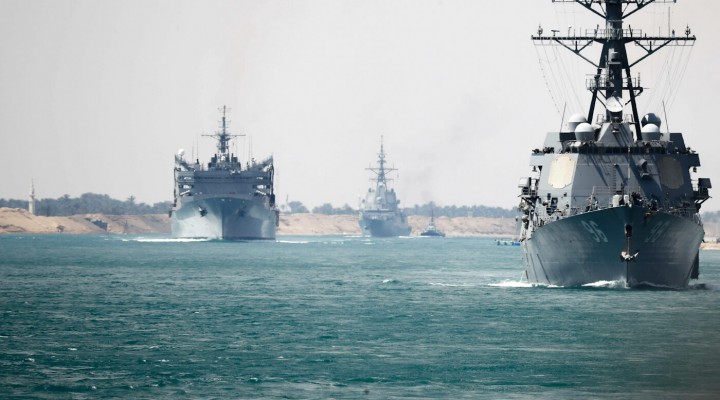Inviting Israel into the Gulf

The last thing Saudi Arabia and its partners need is Israeli ‘protection’
The inclusion of Israel in the regional alliance being formed by the US to supposedly protect shipping in the Gulf and Strait of Hormuz signals a great leap forward in the creeping process of normalisation between Israel and most of the Arab Gulf states.
Israel is not a littoral state of the Gulf and does no maritime trade there. Nor is it a big naval power which can add any meaningful capacity to the hundreds of US, British and allied warships and support vessels that crowd the waterway. Its inclusion in this alliance is purely a ploy to speed up normalisation in the military and security spheres and entrench it as a key player in the region.
It was Foreign Minister Israel Katz who first revealed that Israel was joining this coalition. He said its main contribution would be in ‘intelligence operations’ – one of Israel’s most lucrative exports – and that he expected this to lead to the establishment of full relations with the Gulf states.
This coalition has been shunned by most European countries, with the notable exception of Britain. They do not want to be associated with the current US administration’s reckless policies in the region, nor be dragged into the wars that could result against Iran and its various allies and surrogates.
Trump’s constant escalation of military and security pressure on Iran and ratcheting up of tensions in the Gulf region seems to be part of a pre-conceived plan. First, scrap the nuclear agreement and impose draconian sanctions to suffocate and starve the Iranian people, thus provoking retaliatory action by Iran. This can then be used as a pretext to ‘internationalise’ the Strait of Hormuz (which lies in Iranian and Arab territorial waters), a move that could end up triggering a war.
Israel’s membership of the naval coalition is a prelude to anointing it as Washington’s chief surrogate in safeguarding the Gulf states from the threat supposedly posed by the Iranian bogeyman. This means disconnecting these countries entirely from their Arab and Islamic milieu and tying them completely to Israeli in a new security-military structure.
The Israelis and Trump’s advisers believe that now is the right time to make such a move, given that the traditionally most influential Arab states – such as Iraq, Syria, Egypt and Algeria — are preoccupied with domestic difficulties. They seem to have calculated correctly, at least for the moment. No objections to this move have yet been heard from Iraq or Egypt, specifically, let alone the Gulf states.
Yet in the past, whenever the US formed coalitions to fight wars in the region – whether the Kuwait war, the invasion of Iraq or the campaign against the Islamic State group — the US deliberately excluded Israel to avoid causing a public backlash.
By joining this naval coalition Israel will become a direct partner in any war the US wages on Iran. That means the Iranians and their allies and proxies will consider its vital infrastructure, and not just any naval vessels it deploys in the Gulf, a legitimate target for retaliatory missile strikes. Israel’s membership of the coalition could also play into the hands of the authorities in Tehran, enabling them to rally more public support and to isolate the Gulf states due to their collusion with Israel and its expansionist schemes.
Israel, just like its US ally, will not be providing its protection and security services for free. It can be expected to start sending the Gulf states the bills and demanding repayment, in the form of both cash and political concessions.
Trump, for his part, was elected on a platform of not starting any more costly Middle East wars. If he concludes that a war on Iran on Israel’s behalf and at its instigation is an electoral liability, he could simply pull US forces out of the region – as he did in Iraq, is about to do in Afghanistan, and may also do in Syria. That would leave the Gulf states hostage to Israel’s supposed ‘protection’ and its political dictates.
These states have made a number of major strategic miscalculations in recent years: they colluded in the occupation of Iraq, which fought Iran for eight years to protect them; they are beginning to admit the failure of their war on Yemen, and their regime-change adventure in Syria backfired disastrously. Entering into an alliance with Israel would their biggest blunder yet.
Israel would barely be able to protect itself in the event of war breaking out with Iran. It would be in no position to protect anyone else, least of all the Gulf states.
https://www.raialyoum.com/index.php/inviting-israel-into-the-gulf/
 TheAltWorld
TheAltWorld 
0 thoughts on “Inviting Israel into the Gulf”